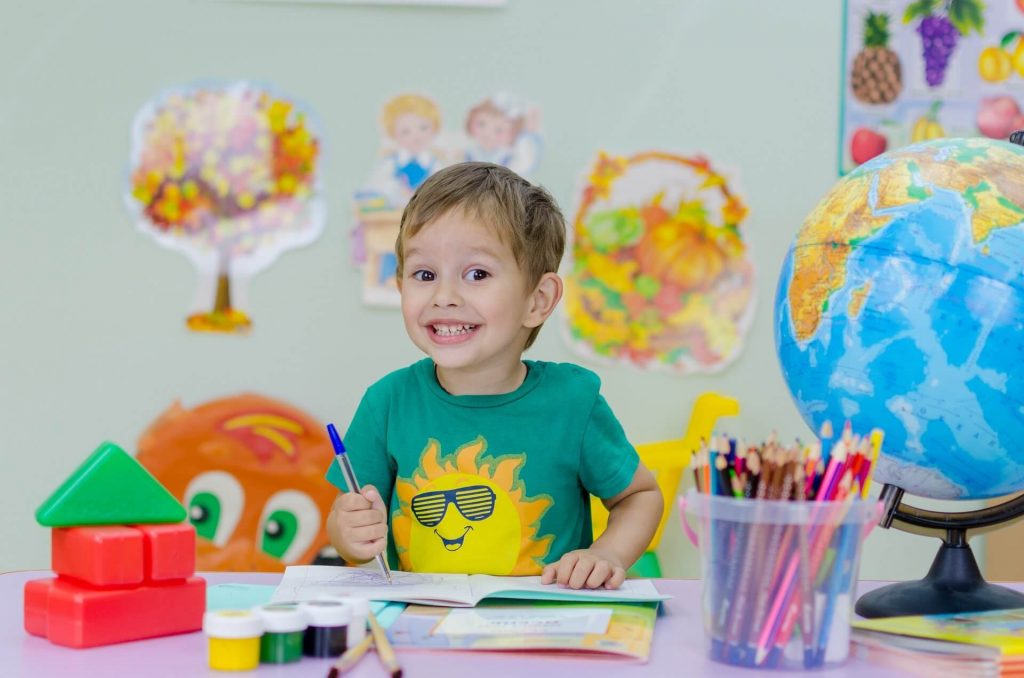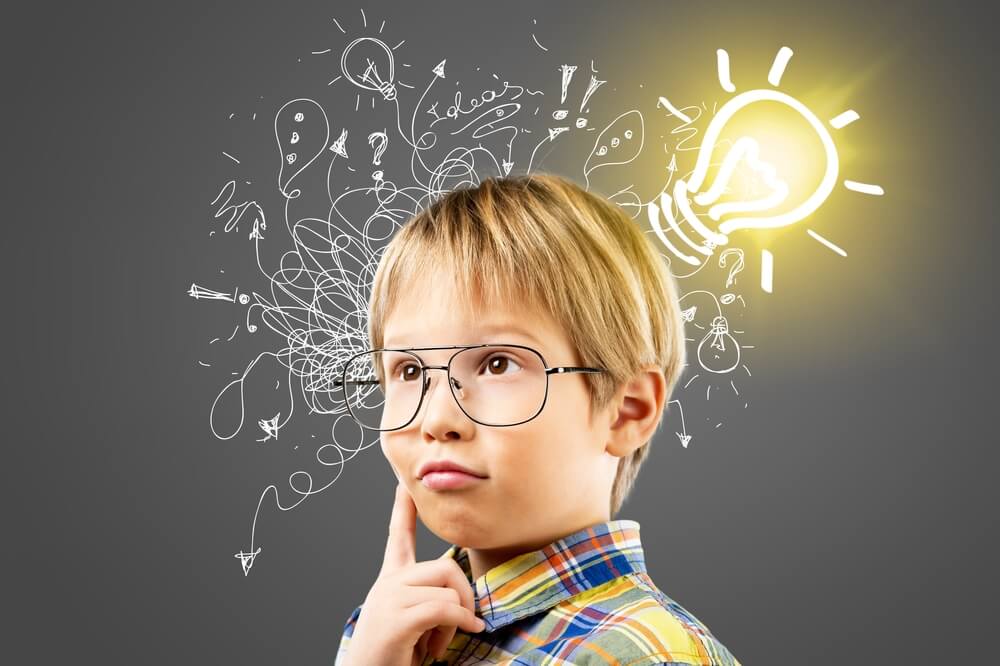What is Emotional Intelligence and How to Bring Up a Happy Child?

Today every respecting parent thinks that it is essential to place their child in all possible extra-curricular classes, like “Little Scholar”, “Clever Boys and Пirls”, “Wunderkinds”. At the age of three, modern mothers and fathers want their children to speak English, be able to count to 100 and draw like a Van Gogh.
But nearly no one from modern parents pays attention to the development of the emotional world of their child, their emotions, communication skills, and, in general, anything that is part of “emotional intelligence”. Adults think that these processes should develop in their children by default, without any help from around. And this is a big mistake.
The depleted emotional sphere starts to “slow down” the development of the intellectual processes. With this, increased technological impact on our lives and the use of gadgets by adults and kids cause the development of the “dry heart” phenomena: children become unemotional, less responsive to the feelings of others, and non-understanding of their personal emotions—their emotional intelligence is not developing.
So, what can parents do? The answer is easy—develop the emotional intelligence of the child, to teach them to understand themselves and others.
In this article, you will learn about the meaning of emotional intelligence and will find out if it affects success in school learning. Moreover, you will get an insight into methods and ways of developing the sphere of emotions and feelings of your child.
Contents:
- Emotional Intelligence: Meaning and Components
- Signs of a Low Level of Emotional Intelligence
- Diagnostics of EQ
- Development of the Sphere of Emotions and Feelings in Children
- Practical Advice for Parents
- Games and Exercises for the Development of Emotional Intelligence in the Child
Emotional Intelligence: Meaning and Components

Prostock-studio/Shutterstock.com
Emotional intelligence is a type of intelligence that is responsible for the person’s identification of personal emotions and the emotions of those around them, as well as ways of managing them. Scientists have started to be interested in it relatively recently. The first research on it was done in 1990. Its authors—Peter Salovey and John Mayer, identify four compounds on emotional intelligence:
- Perceiving emotions—the ability of the person to identify personal emotions and the emotion of other people (by facial expressions, moves, poses, behavior, and voice).
- Understanding emotions—the ability to identify the reasons for the appearance of a certain emotion in self and in others, identification of connections between emotions and thoughts.
- Managing emotions—the ability to suppress, awake, and direct personal emotions, as well as the emotions of others, to reach specific goals.
- Using emotions for stimulating thinking—awakening creativity and activation of brain work using personal emotions.
In other words, the theory of the development of emotional intelligence is based on the child’s experience of going from understanding of emotions to managing them.
How Emotional Intelligence Can Help the Child in School Education?

Prostock-studio/Shutterstock.com
The specificity of the modern learning approach demands from the child increased concentration, quick reactions to the changing environment, development of communicative skills, and suppression of instant desires in order to reach a set goal.
Here are some interesting results of the recent study of the emotional intelligence of high-school pupils that was conducted in a secondary school in 2018:
| Levels | Very high level | High level | Average level | Low level | Very low level |
| Results in % | 5% | 15% | 31% | 23% | 26% |
⠀
Students with high and average levels of feelings sphere development were adapted to the condition of school life. They were better at setting up and maintaining communication with teachers and classmates and were more successful in their studies.
Students with low and very low development of emotional intelligence were experiencing difficulties in communication with classmates and teachers, often had conflicts with them, and appeared isolated from the group. They were often unable to cope with the emotional state in high-stress and critical situations. They were also very average in their learning.
Сheck whether your child is at school and if everything is fine there! Install the Findmykids app right now.
Is it Essential to Develop Emotional Intelligence?
Without a doubt, it is important. In order to detect the level, at which your child stands in their emotional and feelings sphere right now, you need to know the signs and criteria for low emotional intelligence, as well as methods of its diagnostics.
Signs of a Low Level of Emotional Intelligence

Prostock-studio/Shutterstock.com
The level of emotional intelligence is called emotional quotient or EQ.
The person with a low level of EQ:
- Not able to sympathize and empathize with another person. They are not touched by the sadness of another person nor by the happiness. This person cannot accept the help of others, as they do not understand the motifs of the people.
- Close relationships, like love or friendship, are not available for these people, as friendship asks for mutual compromise, emotional exchange, sympathy, and emotional support. Even if such a person creates a family, there will be no loving and attentive atmosphere there.
- Not able to control their emotions. Often such a person demonstrates rampant joy followed by uncontrolled rage or long-term sadness. They also get lost in emotionally tense situations.
- Does not understand that their own uncontrollable emotions may lead to sad consequences; these people blame others, but not themselves, in any unpleasant situation.
- Does not know how to talk about feelings and cannot answer the question “What do you feel now?”. They do not listen to their own emotions.
Diagnostics of EQ
Currently, there are three methods of measuring EQ in teenagers and adults:
- Methods that study separate abilities that together make up emotional intelligence.
- Methods that are based on how the person thinks about themselves.
- Methods that use self-esteem and rating of emotional intelligence by the family of the person tested, their colleagues, and friends.
The diagnostic of the emotional intelligence level in preschool kids and school-aged kids uses projective imaging tests, like “Continue to draw: the world of objects—the world of people—the world of emotions”, as well as various difficulty level questionnaires.
If you find it difficult to perform the diagnosis of the emotional intelligence of the child, talk to the psychologist in the school or kindergarten.
Development of the Sphere of Emotions and Feelings in Children

Prostock-studio/Shutterstock.com
From what age it is important to start developing emotional intelligence? From birth. From the very first day of your child’s life. We will tell you more about how the development of emotions and feelings of the child takes place at each stage of upbringing.
Young Age (From Birth to Three Years Old)
The development of emotional intelligence begins as soon as the child is born. He sees the smiles of his family, feels their touch, and leans to accept and identify emotions of happiness, love, and care.
On the child’s third week on earth, they start to develop a set of live reactions—a special emotionally-moving reaction that is directed onto the adult, which is expressed in the visual concentration on the faces of the mother and the father, then, smiles and moves, as well as sound production.
A child’s familiarity with emotions of fear, sadness, and pain, starts with cramps, teeth development, or when the mother leaves them for a long time.
Preschool Age (4-7 Years Old)

Prostock-studio/Shutterstock.com
At the preschool age, the development of the child’s emotional intelligence continues. The child familiarizes with the names of emotions, learns how to identify them in others, and finds out ways of overcoming anger and aggression.
The main thing at this age is to fully live through the whole spectrum of feelings. But they should be supported by the parents in this. Remember how often you heard from your parents, or, maybe, you said to your child, “Do not cry!”, “You are upset because of nothing”, “You are spreading snivels”, “Do not fight, you are a girl”. This is nothing but the suppression of a child’s emotions, and their depreciation, which is not only standing in the way of the development of emotional intelligence but makes the child ashamed of their own feelings.
Psychologists warn that keeping strong emotions in the preschool age can cause neurosis and psychological problems in adult life.
When being accepted to the kindergarten, the child gains first skills in social cooperation and learns to make friends and communicate with peers and adults.
School Age (7-10 Years Old)

Prostock-studio/Shutterstock.com
At school age, the most intensive development of the child’s emotional intelligence takes place. They gain the knowledge of how to accept own feelings and emotions and learns to control them. The child starts to understand the feelings of other people, finds a mutual communication language with them, and is now able to imagine how it is in someone else’s place, to sympathize.
The main two sources for the child’s discovery of the world are family and school. At school, the child takes part in the life of the class and cooperates with classmates and teachers.
The child can come across bullying, unpleasant classmates, and biased teachers. Difficult situations play a big role in the child’s life, giving them the possibility to feel own abilities that will, on the one hand, bring happiness and pride for own achievements, but, on the other hand, cause anger and disappointment. Here, emotional intelligence becomes some sort of life regulator, which sets the needed emotional information and removes the unneeded one.
Teenage Years (10-18 Years Old)

Prostock-studio/Shutterstock.com
This age is characterized by the “thunder” of emotions and feelings, which the teenager cannot always cope with. A young man or a woman starts to realize their own exclusiveness and originality, at the same time, contrasting oneself with others, which often leads to conflicts with both peers and adults.
It is difficult for the teenager to process emotions, and it is often not understood what happens to them. Emotional manifestations are very unstable in teenagers: from wild joy to uncontrolled outbreaks of aggression.
Therefore, it is important for the parents to become understanding and sympathizing friends for the child in this uneasy period of growing up, instead of turning into strict dictator that is constantly demanding to obey and keep to the set rules and norms. Mothers and fathers should not reject or devalue the difficult, and sometimes controversial, emotional thoughts and actions of their children.
Practical Advice for Parents

Prostock-studio/Shutterstock.com
It is important for parents to understand that there are no good or bad emotions. Each emotion that is felt by the child is important and needed for their full and harmonizing cooperation with the surrounding world. The child should reach the management, creation, and changing of the world around themselves through understanding and living through their own or someone else’s emotional state. This is what will become key to their successful future.
Development of emotional intelligence is based on the gradual learning of each step by the child:
Understanding of Own Emotions
At this stage, the child is familiarized with all the variability of the emotional world, learns about the names of each emotion, and how it is manifested, listens to themselves, learns to differentiate between emotions, and understands the reason for its appearance.
For the parents at this stage, it is recommended:
- To tell the child about feelings and emotions through using visual materials: images, books, and children’s literature with illustrations
- To read fairy tales and to watch cartoons with a high amount of emotional content together
- To talk about their own feelings and the feelings of their child in various situations, “I am now very angry because you broke the mug”, “I see that you are upset because your favorite toy car broke down”, “Your grandmother is happy that you have given her such a beautiful painting”
- To ask the child every day “What mood are you in today?”, “What did you feel today?”
Understanding the Feelings of Other People

Prostock-studio/Shutterstock.com
The child finds out that other people have emotions too, learns to identify what other people feel by their facial expressions, pose, behavior, learns to support and emphasize.
It will be useful for parents:
- To not build an ideal, joyful, and happy with life person 24 hours a day. The child should see a real you: sometimes upset, sometimes tired, and sometimes angry. Only then, the kid will be able to learn to understand the feelings of others and to change their behavior according to them, “Dad is upset today, he has problems at work. Let’s not play noisy games today and watch a cartoon in your room instead”
- To discuss the behavior of characters in fairy tales and cartoons, “What, in your opinion, felt Cinderella when she returned home after the royal ball?”, “What mood, do you think, Snow White was in when she got lost in the woods or met dwarfs?”
- To develop a feeling of empathy in the child. Do not forget that the mother and father are examples of copying. If there is no trusting relationship in your family, loving atmosphere, acceptance, and support, the child will not gain these feelings
Management of Own Behavior
As soon as the child starts to understand and analyze what he feels, he will be able to control and manage with emotional state.
Parents should:
- Teach the child the acceptable ways of releasing the anger: to hit the pillow, rip papers, stump their feet
- To teach to listen to body feelings
- To choose, together with the child, ways of improving emotional state: to go for a walk outside, to watch a cartoon, to listen to happy music
Social Interaction and Use of the Emotional Resource for Reaching Goals

Prostock-studio/Shutterstock.com
In order to become a happy and successful person in the future, the child needs to learn to cooperate with people around: to set and support interpersonal relationships, to help at the right time, to solve conflicts, and to be able to work as part of the team. This can be reached by understanding well personal feelings and those of others. And, at the top of the pyramid is using emotional resources for reaching set goals, personal development, and self-realization.
It is important for the parents:
- To develop the communication skills of the child in games with adults and peers, watching cartoons and films, reading literature on the topic of friendship and friends
- To develop adequate self-esteem, independence, and self-confidence. The child should recognize the responsibility for each action and be ready for consequences
Games and Exercises for the Development of Emotional Intelligence in the Child

Billion Photos/Shutterstock.com
Psychologists recommend using games and exercises to enrich the sphere of feelings and to develop the emotional intelligence of children of different ages. All of these can be used by parents to help their child to understand themselves and other people.
Games with emotional pictograms
Prepare pictures with emotions of happiness, sadness, anger, fear, surprise, calmness, etc. You can use them separately or make up a so-called “Cube of Mood”. The child is asked, “What mood are you in today?”, and he chooses a correct image. Then, you can make the game more difficult by asking to describe the specific situation, for example, “Kate had a fight with her best friend, Mary. What do you think she felt? What mood is she in?”.
Exercises “Show an emotion”
The child is using facial expressions and poses to show the correct emotion—mother and father are choosing, or another way around. You can make a competition for the best presentation of emotion.
Game “I am happy when…”
The child, together with the mother and father, are telling each other about situations that make them feel happy, scared, upset, surprised, etc.
Getting rid of the anger
In situations when the child is very angry or very upset, use a “bag of anger” or a “pillow of anger” that can be punched, thrown around, or stumped on. In this way, the child is releasing the accumulated strong emotions without causing any harm to those surrounding them.
Watch cartoons and films, read literature followed by a discussion of heroes’ feelings
This is everything the parent should know about the emotional intelligence of a child and the need for its development. If you want to bring up a happy and successful person that is able to live in harmony with self and with the world around, teach them to understand themselves and others!
⠀
Here’s everything parents need to know about their child’s emotional intelligence and the importance of its development. If you want to raise a happy and successful individual who lives in harmony with themselves and the world around them, teach them to understand themselves and others!
Проверьте электронный ящик



















